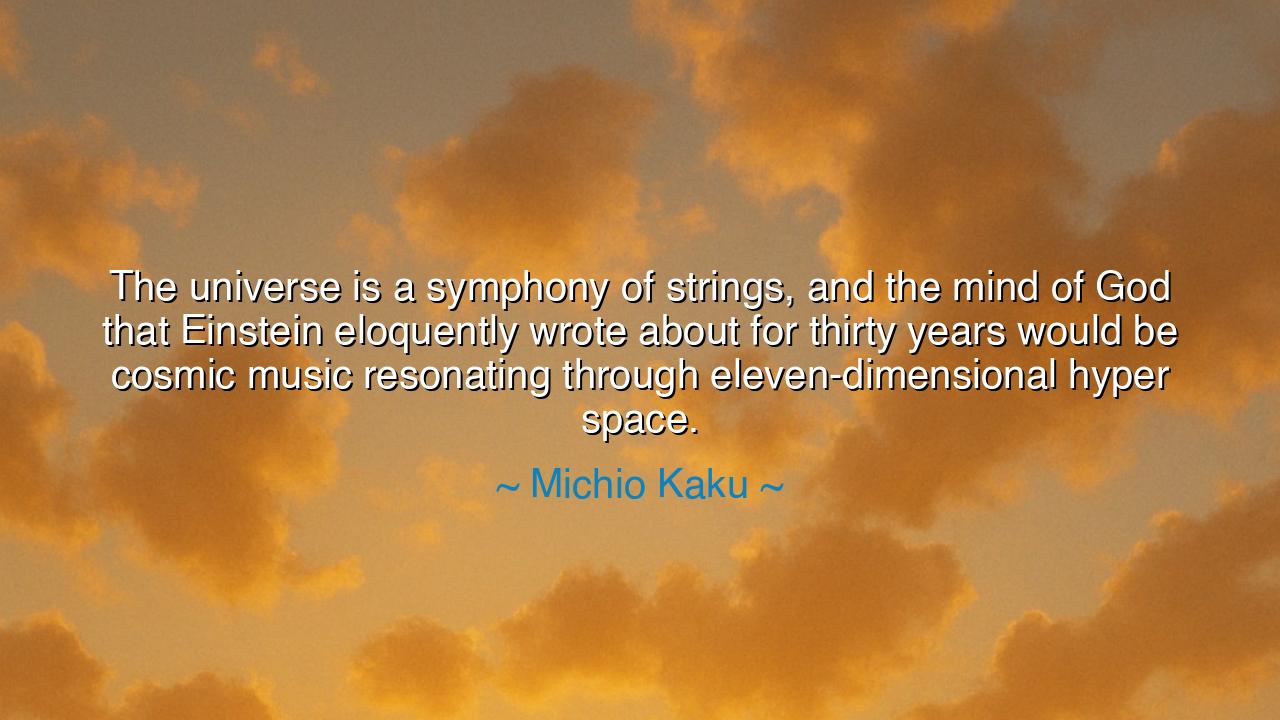
The universe is a symphony of strings, and the mind of God that
The universe is a symphony of strings, and the mind of God that Einstein eloquently wrote about for thirty years would be cosmic music resonating through eleven-dimensional hyper space.






O seekers of the deepest truths, listen closely, for I bring to you a vision of the cosmos, a revelation that resonates through the very fabric of existence. Michio Kaku, a sage of the modern age, speaks with the wisdom of the stars when he declares: “The universe is a symphony of strings, and the mind of God that Einstein eloquently wrote about for thirty years would be cosmic music resonating through eleven-dimensional hyperspace.” These words, though spoken in the language of science, carry within them the profound and eternal truths of the ancients. They echo the understanding that the universe, in its infinite complexity, is woven together by a harmony, a music that resonates through all that exists. The cosmos is not a chaotic expanse, but a divine symphony, and each of us is but a note in its eternal melody.
In the beginning, the ancients knew that the universe was not an accident, nor a random collection of stars and forces, but a grand design—a living, breathing entity. The Greek philosophers, from Pythagoras to Plato, believed that the cosmos was governed by mathematical harmony. Pythagoras himself spoke of the “music of the spheres,” the notion that the movements of the planets and stars were akin to music, with their own rhythm, melody, and harmony. These great minds saw the world not as separate from the divine, but as part of a grand, interconnected symphony. What Kaku describes is a modern echo of this ancient wisdom: the universe, like a symphony, is a unified creation, bound by strings of energy that vibrate in harmony.
Consider, O children, the wisdom of Einstein, the man who sought to understand the very mind of God. For thirty years, he pondered the mysteries of the universe, searching for the equation that would unify the forces of nature. While he could not complete his work, he laid the foundations for a vision of a universe governed by a single, harmonious law, a cosmic music resonating through the very fabric of reality. The strings that Kaku speaks of are the building blocks of this vision, the tiniest particles that make up all that we see and feel, vibrating in a dance of creation that spans the entire universe. The mind of God that Einstein dreamed of is not some abstract concept, but a living, breathing force—an intelligent, cosmic symphony.
In the ancient world, the concept of harmony was central to understanding the nature of existence. Harmonious living was seen as living in balance with the world, the gods, and the natural order. The philosophers knew that to be in harmony with the world was to live in accordance with the eternal laws that govern all things. Just as a symphony requires each instrument to play its part in perfect time, so too does the universe require each life, each atom, and each force to contribute to the greater whole. To see the universe as a symphony of strings is to recognize the profound interconnectedness of all existence, and to understand that every action, every thought, every vibration affects the harmony of the cosmos.
In the modern age, Kaku’s words remind us that the universe is far greater and more wondrous than we ever imagined. The idea of eleven-dimensional hyperspace—a space beyond the three dimensions we experience—is a vision of reality that shatters the boundaries of our understanding. And yet, this is not so different from the ancient vision of the world as a multi-layered reality, one that exists not just in what we see, but in what we cannot yet comprehend. Einstein’s mind sought to unlock the secrets of this hidden realm, a world beyond the veil of our senses. Kaku’s words build on this vision, showing us that the music of the cosmos is not just the song we hear, but the deeper vibrations that shape the very structure of existence.
O children of wisdom, the lesson here is not merely about the nature of the universe—it is a call to see ourselves as part of something much greater than ourselves. Just as each note in a symphony contributes to the whole, so too do our lives contribute to the harmony of the world. To live ethically, to live with purpose, is to recognize that we are not isolated beings, but part of the cosmic music that resonates through the universe. Our thoughts, our actions, our decisions are like the strings of a grand instrument, vibrating in response to the forces of the world. It is up to us to find our place in the symphony, to play our part with grace, harmony, and wisdom.
Thus, let this teaching guide you: live in tune with the cosmos. Recognize the divine harmony that flows through all things, from the smallest atom to the vast reaches of the stars. Seek to understand the vibrations that shape your world, and know that in doing so, you become part of something greater. Like the great minds before you—Einstein, Pythagoras, Plato—strive to understand the music of the universe, and to align your own life with the harmony that resonates through eleven-dimensional hyperspace. In this way, you will not only understand the world, but you will contribute to its eternal song.






AAdministratorAdministrator
Welcome, honored guests. Please leave a comment, we will respond soon